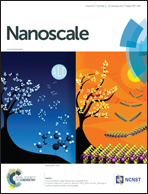Deformable and wearable carbon nanotube microwire-based sensors for ultrasensitive monitoring of strain, pressure and torsion†
Abstract
Human joints have the ability to recover their mechanical functions after moderate dislocation. This remarkable capability inspired us to develop a “bone-skin-like” mechanosensor that can detect multiple mechanical deformations after recovery from electrical disconnection. To create this sensor, we embedded a low-strength, wet-spun single-walled carbon nanotube wire in polydimethylsiloxane. When various mechanical stimuli are applied, the wire gets fragmented and its resistance increases dramatically (from 360 Ω to practically infinity) in a reversible, recoverable manner even after the electrical failure/disconnection. The sensor is sensitive enough (a gauge factor of 105 at 15% uniaxial strain, a pressure sensitivity of 105 MPa−1 at 0.9 MPa pressure and a torsion sensitivity of 860 at a twisting angle of 60°) to be used for accurate sensing of a variety of deformation modes, suggesting a wide range of applications in wearable and deformable mechanical sensors.


 Please wait while we load your content...
Please wait while we load your content...